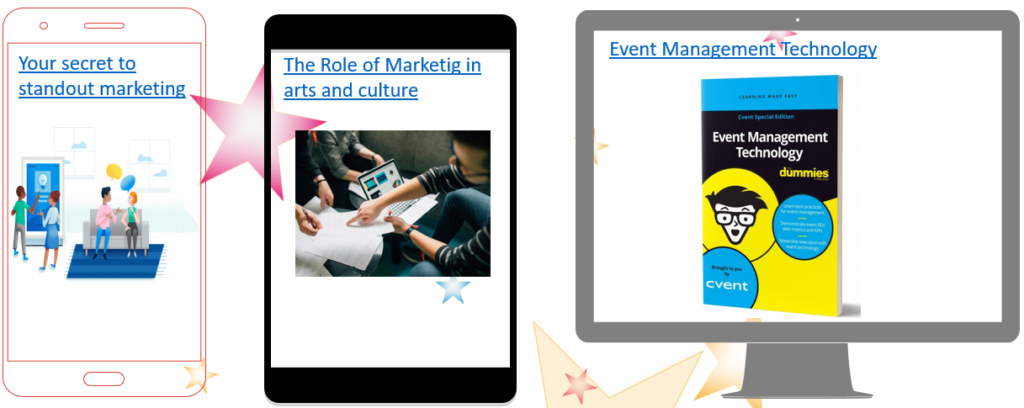
Module 3
"Event Creation and Management"
"Event Creation and Management"
Aim
The purpose of this module is to define the features and ways of creating events, as well as to determine the stages of work (steps) of creating an event. It involves studying the brand, identifying its target audience, devising the event concept, and coordinating the technical aspects before launching the event.
Watch and discuss
The purpose of this module is to define the features and ways of creating events, as well as to determine the stages of work (steps) of creating an event. It involves studying the brand, identifying its target audience, devising the event concept, and coordinating the technical aspects before launching the event.
By the end of this module, you should be able to...
Knowledge
Theory and practice of an organization
Knowledge of technical production
Knowledge of project design process
Definition of the target group
Theories of multimedia
Skills
- Creativity
- Organization idea
- Ability to work in a team
- Ability to work under stress
- Motivational skills
- Communication skills
- Media Literacy
Attitudes
- The modern culture events are a popular form of performing arts.
- Every event is unique.
- No one can teach you how to produce an idea.
- The event is part of the culture of spectacle (Guy Bebord)
Key-concepts
Key-concept 1
Ideas, goals and planning
Each project contains goals, preparation, and duration time.
Implementation process and interactivity with the audience of the goals should be realistic.
Multimedia concept.
Key-concept 2
Values
In the preparation phase, you need to determine the values you are promoting.
It can be social engagement, fun, changing the stereotypical attitude.
Key-concept 3
Audience and promotion
Before you start organizing an event, research the audience you are addressing . Remember that without an audience there are no events. Audience is a target group for promoting plan.
Key-concept 4
Space
The space in which the event takes place also determines its values and characteristics of events.
Spaces can be theatres, but also parks, glamorous halls…
Event Creation
Together with your team, talk about what metrics you’ll use to define the success for your event. Perhaps it’s ticket sales, attendance records, feedback from speakers or guests, or a review and evaluation of your event planning and process to figure out what worked and what could use improvement.
Planning Skills
The Event Planning Template isn’t just for “before” stages of the event. It can also be used to evaluate the event’s different functions afterward. You can also publish a series of post-event content to keep the conversation alive, even after the real-time event has wrapped up.
Benefits
Development of creativitiy with team
When working together as a team, it enables us to learn from one another. Teamwork fosters creativity and learning, maximizing shared knowledge and expanding new skillsets.
Although individual productivity is important, teamwork is essential in solving complex issues. Teamwork can generate a sense of trust and loyalty amongst employees, which motivates them to communicate, cooperate and be supportive of one another.
Creative teamwork in event management motivates artists.
Work outside the institution
Become part of the business or entrepreneurial sector.
Be creative – step out of your “box”
Creativity
A key to being creative, according to Yale Insights, is the ability to find associations between different fields of knowledge, especially ones that appear radically different at first. The process is iterative rather than linear and requires people with curiosity, energy, and the openness to see connections where others cannot.
Think with you team about what matters to you all to be able to define the success of your event.
Always have a plan B
Whether it is a video broadcast, a workshop , or a small concert.
If your events is outdoors, the production is much more complex. In that case, the most important thing is to know where you will perform the event if it rains.
Benefits
Events are multimedia performances
After working on an event, the actor can enter the world of show business.
Events use more and more new technologies and can be performed online as well.
Events can be socially engaged
Events are more popular today than classic stage performances.
Events belong to the culture of the spectacle. Events are part of cultural industry.
Events are a place for meeting the people, and place to make contacts and share ideas.
Event Academy
EVENT MANAGEMENT: AN IMPORTANT INDUSTRY
Event management is the application of project management to the creation and development of large-scale events. It involves studying the brand, identifying the target audience, devising the event concept, planning the logistics, and coordinating the technical aspects before launching the event.
Many ‘non-event types’ think that designing and producing an event is easy. Just find a venue, come up with a good theme, get some food and drink, book a band, and send the invites out on time.
Unfortunately, like many things that seem simple creating a successful event requires a lot of hard work and a diverse range of skills and experiences from project planning to budgets.
Design the concept and idea of an event
- Select a team of authors, operational, technical.
- Determine the place and time of execution
- Divide tasks
- Set deadlines
- Determine the date of the briefings
- Determine implementation plans
- Determine the dates of the general rehearsals
Realize your idea
Action Plan
Step 1
Make up a project/event idea.
Make a list of resources.
Choose a team.
Divide tasks.
Create a time frame for realization.
Determine the place of realization.
Step 2
Make a realization plan.
Check regularly how far you have come with a plan.
Schedule regular team meetings.
Be a leader who motivates your associates.
Step 3
Make a marketing and promotion plan.
Make a list of the media through which you will advertise.
Invite all the people you know to help you.



